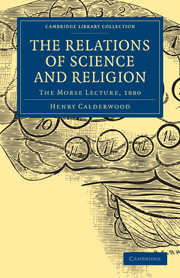Book contents
- Frontmatter
- EXTRACT FROM THE DEED OF TRUST, ESTABLISHING THE MORSE LECTURESHIP
- PREFACE
- Contents
- LECTURE I CONDITIONS OF THE INQUIRY
- LECTURE II EXPERIENCE GATHERED FROM PAST CONFLICTS
- LECTURE III INORGANIC ELEMENTS IN THE UNIVERSE
- LECTURE IV ORGANIZED EXISTENCE. LIFE AND ITS DEVELOPMENT
- LECTURE V RELATIONS OF LOWER AND HIGHER ORGANISMS
- LECTURE VI HIGHER ORGANISMS;—RESEMBLANCES AND CONTRASTS
- LECTURE VII MAN'S PLACE IN THE WORLD
- LECTURE VIII DIVINE INTERPOSITION FOR MORAL GOVERNMENT
- APPENDIX
LECTURE III - INORGANIC ELEMENTS IN THE UNIVERSE
Published online by Cambridge University Press: 05 October 2010
- Frontmatter
- EXTRACT FROM THE DEED OF TRUST, ESTABLISHING THE MORSE LECTURESHIP
- PREFACE
- Contents
- LECTURE I CONDITIONS OF THE INQUIRY
- LECTURE II EXPERIENCE GATHERED FROM PAST CONFLICTS
- LECTURE III INORGANIC ELEMENTS IN THE UNIVERSE
- LECTURE IV ORGANIZED EXISTENCE. LIFE AND ITS DEVELOPMENT
- LECTURE V RELATIONS OF LOWER AND HIGHER ORGANISMS
- LECTURE VI HIGHER ORGANISMS;—RESEMBLANCES AND CONTRASTS
- LECTURE VII MAN'S PLACE IN THE WORLD
- LECTURE VIII DIVINE INTERPOSITION FOR MORAL GOVERNMENT
- APPENDIX
Summary
IN view of the wide range of materials at command, and the limits of the present inquiry, there is need for some definite method of selection, which may secure a careful, though necessarily very general survey of the whole ground. That which seems to give most promise of meeting these requirements is the contemplation in order of the great leading conceptions which have received prominence within recent years in consequence of continued research under strictly scientific methods. These may be said to constitute the scientific revolution of the nineteenth century, giving occasion for reconstructing the popular conceptions of the universe. They claim to mark the truly scientific period, inaugurated by command of instruments never before within reach, allowing an immense advance in the modes of research, and placing the secrets of nature within compass of human observation as they had never been before. The intel lectual conditions for observation and inference no doubt remain simply what they have been; the laws of intelligent inquiry are the same, determining sufficiency of evidence, and trustworthiness in reasoning; but the range of observation has been indefinitely multiplied, and things transcending previous conjecture have become matters of certain observation. The telescope and the microscope provided for this revolution. They brought the universe within range as it had never previously been, and thus making an enormous addition to the sum of human knowledge, suggested new modes of contemplating and explaining the facts which had been familiar through all the ages.
- Type
- Chapter
- Information
- The Relations of Science and ReligionThe Morse Lecture, 1880, pp. 82 - 118Publisher: Cambridge University PressPrint publication year: 2009First published in: 1881



